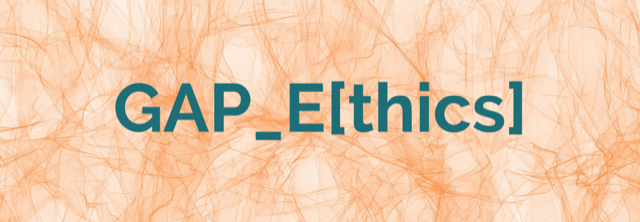GAP_E: transdisciplinary platform exploring technology and ethics
Wednesday 18th May 2022. 13:00 – 14.30
ICC Presentation Suite Room G17 and online
The focus on technology and ethics is intensifying with many sectors calling for transdisciplinary research to develop solutions to a range of societal concerns, particularly in the area of AI related technology development. The UKRI’s March 2021 report Transforming Our World with AI explicitly emphasises the need for fundamental research that integrates the social sciences and humanities with computing science and engineering. Research at Coventry University provides an ideal environment to pursue these solutions together, and that is the goal of the GAP_E[thics] initiative.
GAP_E began over a year ago with the aim of bridging critical perspectives from the arts and humanities, social sciences, computing science and engineering to deepen shared understanding of the complex and challenging issues at stake in this area. The core team comprises Scott deLahunta and Kathryn Stamp from the Centre for Dance Research and James Brusey, Elena Gaura and Alison Halford from the Centre for Computer Science and Mathematical Modelling. To date, the team has won a Doctoral Training Alliance funding for research on AI and Ethics in Smart Cities and embarked on fieldwork on ethical practices in the UK energy data sector.
For this C-DaRE Invites session, GAP_E team members Elena Guara and Scott deLahunta will be joined by external specialists, Alison Powell and Matthew Studley (bios below), to share perspectives on transdisciplinary research in ethics and technology and engage in dialogue to be followed by a discussion with all present. The goal of this hybrid public event is to open this conversation to the wider Coventry University research community as well as connect to similar work happening outside CU.
Panel Members:
Elena Gaura is Professor of Pervasive Computing and Theme Director for Mathematical, Physical and Computational Science at Coventry University. A highly respected figure in the field of cyber-physical systems, she has promoted ethical design protocols in advanced sensor systems to enable data-driven decision making in complex socio-technical settings. Elena is currently working with social scientists, the humanities, and computer scientists to produce cross-discipline and cross-sectoral collaborations in the deployment of AI and intelligence to encourage responsible innovation in the digitalisation of the UK energy landscape.
Scott deLahunta is Professor of Dance, Centre for Dance Research, Coventry University. His research seeks to deepen the understanding of dance as a form of embodied knowledge and choreography as a skilful bodily practice. The aim of this research is twofold. Firstly, to contribute to and reinforce the meshwork of relations within the wider dance community; secondly, to bring this understanding as a unique arts and humanities research perspective into productive conjunction with other disciplines and practices. He is currently working on the intersection of corporeality and ethical practices in AI related technology development.
Alison Powell is the Director of the JUST AI network established in partnership with the Arts and Humanities Research Council (AHRC) and supported by the Ada Lovelace Institute. She is Associate Professor in Media and Communications at the London School of Economics where she established the MSc program stream in Data & Society. Her research examines how people’s values influence the way technology is built, and how ethics in practice unfolds in technology design contexts. Alison experiments with participatory and public engagement methods to investigate how we generate knowledge about technology, citizenship, and our futures.
Matthew Studley is the Wallscourt Associate Professor of Technology Ethics at University of the West of England. His primary focus is robotics, and especially how we can drive this new technology to making our lives better. He has been a project coordinator of the European Robotics League (ERL) through SciRoc Horizon 2020 and currently holds an AHRC grant titled Ethical AID (Ethical AI Development) to look at ways of forecasting the ethical dimensions of a technological process, product or system as it is developed. He is also part of the team at UWE awarded one of the new Turing Network Development Award.
